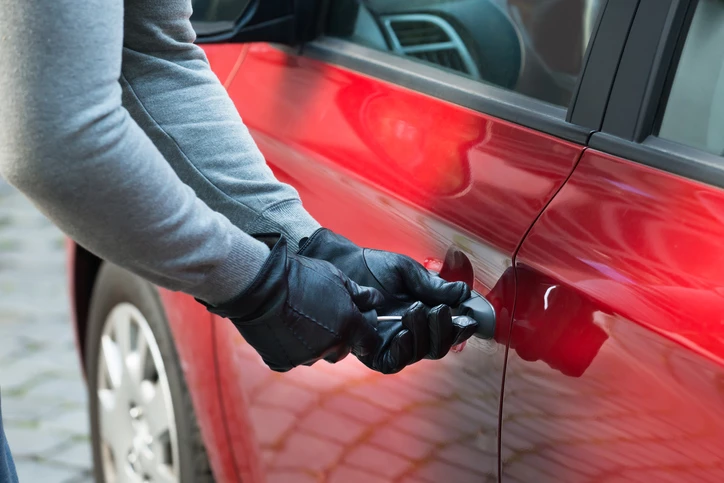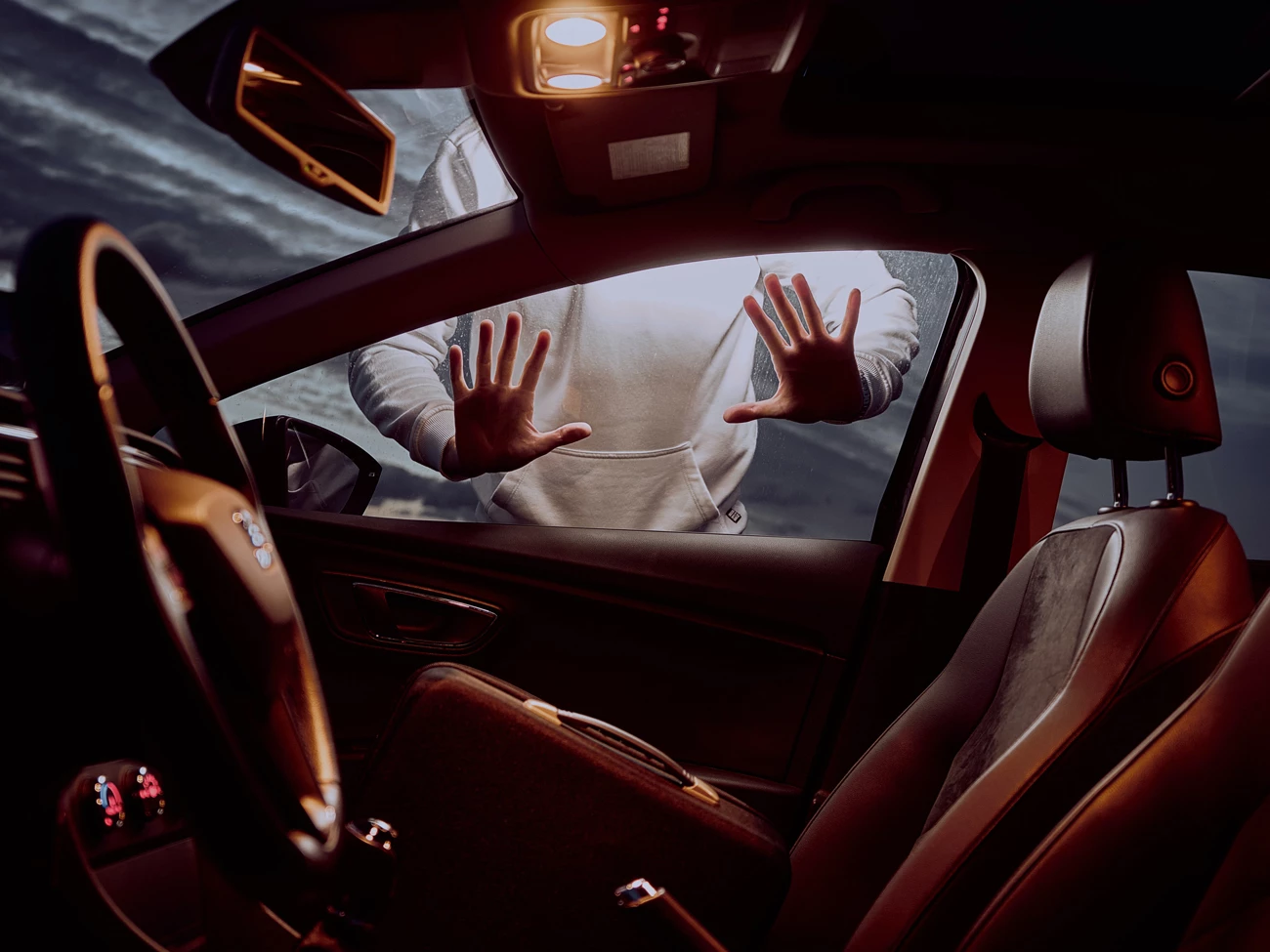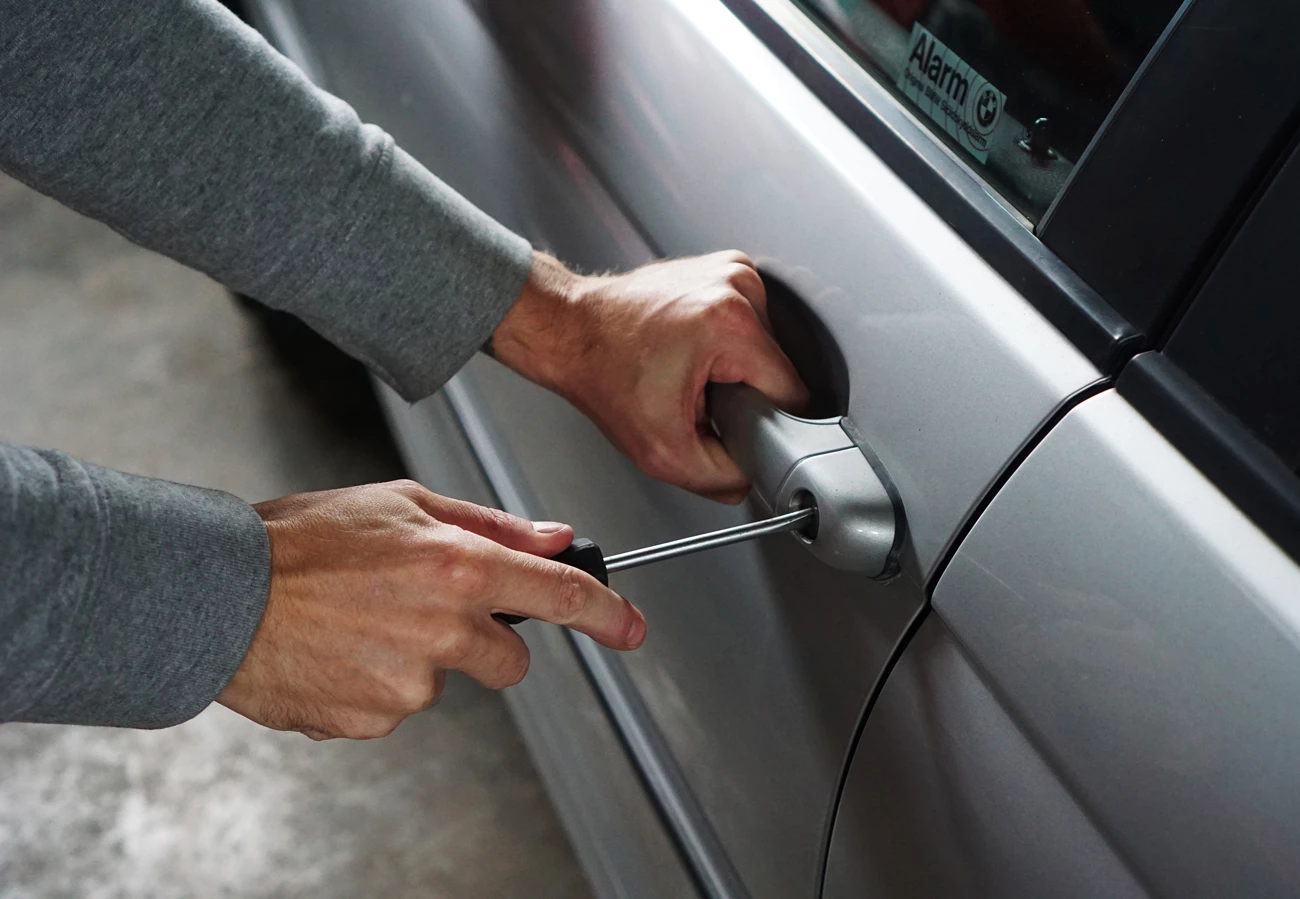21/05/2021 | Category: Commercial Insurance

Motor traders face countless challenges every day, from health and safety to merely surviving in tough economic times.
However, one risk that can be particularly devastating is theft. With such high-value stock on show, the attraction of thieves is inevitable. They will look for areas of weakness in your security, which are often found in the forecourts.
Whether it’s the motor trade forecourt, in transit or at the petrol station, why are vehicles so popular with thieves and what can you do to protect your precious vehicles and stock?
In this article, we will explore exactly that, as well as the value of having motor trade insurance to help protect your business financially if things do go wrong.
Why is car theft so common?
It has always been a prevalent risk given the number of drivers on the roads and the importance of vehicles to our economy. But car theft is becoming an even greater concern, with reported surges in recent years. The DVLA says 154 cars were stolen every day in the UK in 2019. In other words, that’s one every nine minutes.
That’s perhaps because for thieves, there are several reasons why it’s worth the time and effort to steal a car.
The first is for the vehicle itself. Cars, particularly brand-new ones, are highly valuable and represent an easy way to make big money quickly if you know how. Particularly for savvy thieves, it’s not difficult to transform a stolen car into something that can be sold on, even if the theft was reported to the Police.
A criminal might steal a car to source particular parts that are either valuable or can be easily sold on second hand. A common target is the catalytic converter, part of the exhaust that regulates emissions. Thieves will try to get under the car and saw it off, because it contains various valuable precious metals that can be sold, such as copper or platinum.
Meanwhile, they could also target the battery if they can get under the bonnet or go after expensive wheels and rims.
There’s also the possibility of finding valuables inside the car. A thief might break into a car if they see something valuable on display, such as a sat nav or a laptop bag, or if they suspect something valuable is in the glove box.
How thieves have evolved
Technology that prevents theft has majorly improved. Not only do cars have more sophisticated security features nowadays, but people and businesses also have access to more tools when it comes to protecting their vehicles.
But while security capabilities have evolved, so have the criminals. Now, car thieves know about the devices designed to foil them, such as tracking devices. They’re also sophisticated enough to take advantage of technical flaws in advanced technology.
In one case, a car dealership in Norfolk reported a car stolen that was worth nearly £17,000, in a spate of similar thefts in the area over the course of around a month. The victim cited keyless entry-tech as the target for the thieves, who had the ability to use sophisticated technology from a distance to trick the system into unlocking the vehicles.
Forecourts a danger for motor traders
Motor traders will typically see the forecourt as an essential element of the business, the most effective way to show off their most valuable stock to passing customers. However, this means they’re often victims of attempted thefts, despite investing in specialist security.
There are countless examples in the UK in recent years of criminals striking in forecourts, with devastating results. In 2020, a car dealership in Kent was left with a £3,000 repair bill after a third theft in 18 months, despite having spent thousands of pounds on CCTV. In this case, the thief had targeted car parts, while in a previous incident at the dealership, a vehicle worth almost £40,000 was stolen.
Some criminals are highly opportunistic, knowing the right moments to catch victims off guard. Some will wait outside car dealerships, out of sight, for the right moment to quickly jump into a vehicle that has been left unattended – even if only very briefly – and drive away.
Meanwhile, they may have a plan to try to trick staff by pretending to be prospective customers or asking to use the bathroom – essentially whatever they can think of to cause distraction. That was the case in a car dealership in Essex, where thieves used these tactics to catch the staff off guard, managing to drive off in a BMW worth £20,000. The dealership said they had been targeted by thieves several times that year alone.
Thefts in transit
Another way criminals might aim to leave a motor trader out of pocket is by stealing goods while they’re in transit. During this process, there are several moments when concentration can lapse, leaving thieves with an opportunity to pounce.
They may be waiting when a vehicle is delivered to the dealership, or find weak points in the security during the vehicle's journey.
When a vehicle is in a petrol station forecourt, for example, the risk of theft increases if the driver does not take great care. Stepping out of the car for whatever reason, whether it's to fill up the fuel tank and pay, use the bathroom, or grab something to eat, is the kind of moment that car thieves wait for.
Again, there are an eye-opening number of examples of this happening across the UK. In one case, a couple in Lancashire stepped out of their car to put money in a launderette machine in the petrol station’s forecourt. Forgetting to take the keys out of the ignition, a thief approached silently behind them and drove off in their £6,000 car.
Whether it’s an individual or someone delivering a car to or from a motor trader’s dealership, all it takes is a moment of lost concentration to be caught out.
Security tips for the forecourt
With so many risks on the radar for motor traders, it’s important to make sure your business isn’t an easy target in order to reduce instances of theft.
The first step is a good CCTV surveillance system. Not only are CCTV cameras a cost-effective solution, they also act as a good visual deterrent for prospective criminals. Meanwhile, the footage will be ready if you need to provide it to the Police or your insurance company when you make a claim on your motor trade insurance. Your cameras should cover not only the forecourt, but any area inside or outside where you have vehicles or stock.
Leaving areas undetected by your CCTV becomes a theft risk – experienced criminals will spot them when scoping out your premises.
Next, consider investing in an advanced lighting system that will keep the business well-lit at night when you’re not around. Not only will it help to complement your CCTV, it will act as a deterrent from criminals who much prefer to operate in dark places rather than risk being seen in spotlights.
Think about how each car in your dealership can be protected. One way is to secure each car individually, starting with wheel locks. Although it won’t stop all criminals, it will slow them down. A thief will then be less able to take you by surprise and that may make them think twice about trying to steal one of your assets.
As well as making the car much harder to drive off in, it secures the wheels and rims themselves, which thieves often target on their own.
Meanwhile, having the right systems and training in place will give you and your staff the best possible chance of securing your forecourt. This could start with simple layout changes, like making sure there’s only one way in and out of the forecourt, which is much easier to keep an eye on.
Regular security protocol will help you make protecting your business just a standard part of the job. A strict procedure or checklist for closing at the end of every day will help manage security risks. This should include ensuring your cash deposits are secure, locking up and accounting for all inventory, and checking security systems are set for the night.
Meanwhile, routinely changing passwords and passcodes will help to keep them secure. Make sure you do this when any employees leave the business, too, especially if they leave on bad terms.
Then it’s important to protect elements that are targets for thieves. Dealer or trade plates are very useful for thieves who can use them in all sorts of scams, so they will happily steal them from you if you let them. Ensure the plates on your vehicles are fitted with tamper-proof screws, and any spares should be in a secure location. Keep an eye on trade plates too if you allow people to go on solo test drives – something that happened a lot during the pandemic.
Keys and key fobs should also be secured when the vehicle is not being moved or used. Have a strict policy that nobody leaves keys in the ignition, even if only for a moment.
Meanwhile, having the right people around you is paramount. You might want to consider hiring dedicated security if necessary to protect your forecourt, and your general staff should be people you know you can trust and rely on, both to fully carry out security procedures and not commit any theft themselves.
If you are unfortunate enough to have a vehicle stolen, a GPS system being installed will give the Police a chance of tracking it down and getting it back. Some cars will have this already, while others could have an external system fitted that can be taken out when you sell the car and added to your other stock.
Don’t wait until an incident occurs before being protected with motor trade insurance. As a business, your needs will evolve over time. Does your current policy cover everything you need it to? Reviewing your cover regularly is good risk management practice.
Security for cars in transit
When your cars are in transit, for example when being delivered to customers, it’s important to think about how you can stop thieves from getting in the way.
As mentioned above, criminals will target these journeys due to the natural flaws in security that occur, for example when your delivery driver needs to stop for a break, or to fuel up at the petrol station.
Therefore, the first step is to have strict policies in place for employees who transit goods. This should include never leaving the car in a vulnerable position. It’s very easy to forget a vehicle is unsecured when you’re in a rush or distracted, especially when you are only turning your back for a second.
The Police advise always locking the vehicle when you need to get out for any reason. That way, a criminal can’t sneak in and drive away with ease. They also suggest closing the windows or sunroof every time, as some thieves can utilise even the smallest gaps. Using items like coat hangers or wires, they often have the skills to reach items or unlock doors. So, it’s worth factoring both these tips into your transit security procedures.
Again, just like in the forecourt, it’s vital that you fully trust the staff who will be taking your vehicles in transit. These are such high-value assets that extra security checks would not be unreasonable. Don’t take anything for granted – even if you connect well with someone in a job interview, follow up on their references and don’t get complacent. Ultimately, your assets and business are on the line.
Cover from Insurance Choice Commercial can include collection and delivery cover. Ask the team for more information when you get a quote.
Motor trade insurance that works for you
For everyone in the motor trade industry, vehicles and assets are so vital. However, we understand that your business circumstances are totally unique and this is reflected in our approach to motor trade insurance.
For over 20 years at Insurance Choice Commercial, we have specialised in tailored motor trade insurance policies that meet the individual needs of your business. We can offer flexible payment solutions, including paying in monthly installments.
Get a quote for motor trade insurance today.
Policy benefits, features and discounts offered may very between insurance schemes or cover selected and are subject to underwriting criteria. Information contained within this article is accurate at the time of publishing but may be subject to change.
